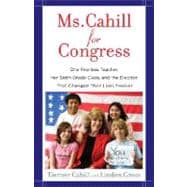
What is included with this book?
| The Decision | p. 3 |
| Getting Started | p. 23 |
| The Opposition | p. 33 |
| Which Race Are We Running? | p. 44 |
| Fits and Starts | p. 53 |
| Swimming in the Deep End | p. 60 |
| Party Politics | p. 65 |
| Holiday Madness | p. 75 |
| Everyone Has an Agenda | p. 84 |
| The Education of Candidate Cahill | p. 96 |
| Politicos in the Making | p. 103 |
| Honor Bound | p. 115 |
| The Perils of Running | p. 123 |
| On the Ballot | p. 139 |
| Reality Check | p. 148 |
| The Primary Push | p. 157 |
| Public Opinions | p. 168 |
| Nonstop | p. 177 |
| Too Much | p. 183 |
| It's Up to Me | p. 192 |
| Vegas Showdown | p. 202 |
| The Final Push | p. 219 |
| Losing the Battle, Winning the War | p. 226 |
| Ms. Cahill Goes to Washington | p. 236 |
| Notes | p. 243 |
| Acknowledgments | p. 244 |
| Table of Contents provided by Ingram. All Rights Reserved. |
The New copy of this book will include any supplemental materials advertised. Please check the title of the book to determine if it should include any access cards, study guides, lab manuals, CDs, etc.
The Used, Rental and eBook copies of this book are not guaranteed to include any supplemental materials. Typically, only the book itself is included. This is true even if the title states it includes any access cards, study guides, lab manuals, CDs, etc.
Excerpted from Ms. Cahill for Congress: One Fearless Teacher, Her Sixth-Grade Class, and the Election That Changed Their Lives Forever by Tierney Cahill, Linden Gross
All rights reserved by the original copyright owners. Excerpts are provided for display purposes only and may not be reproduced, reprinted or distributed without the written permission of the publisher.